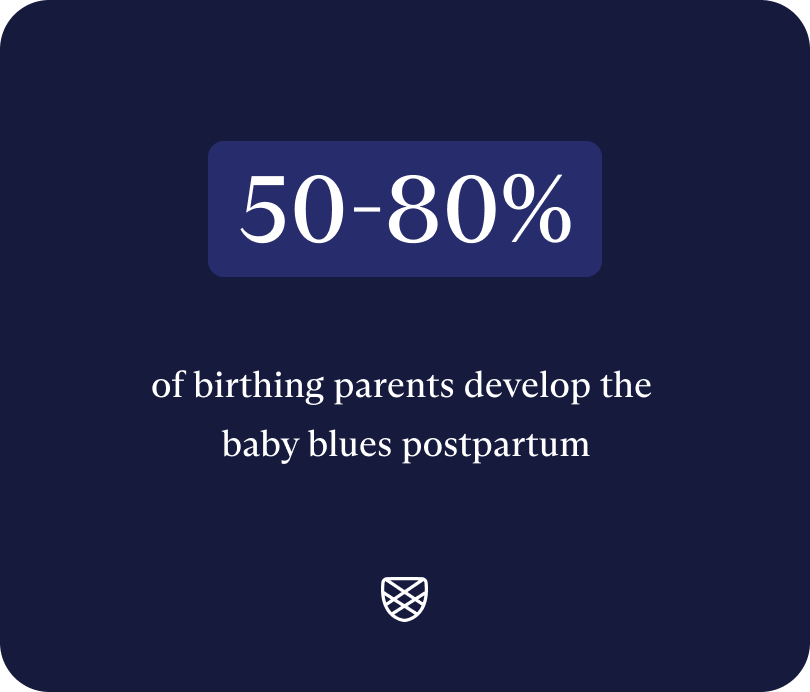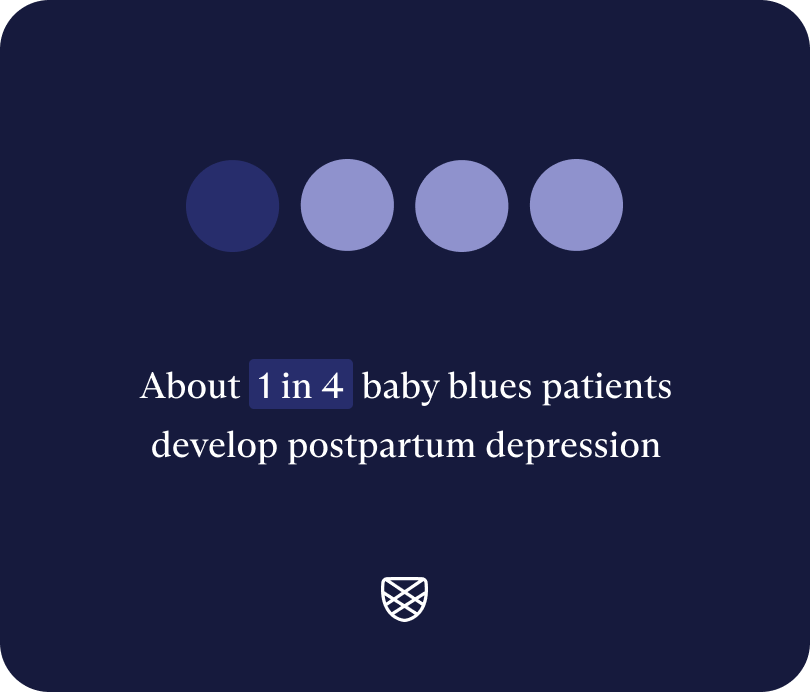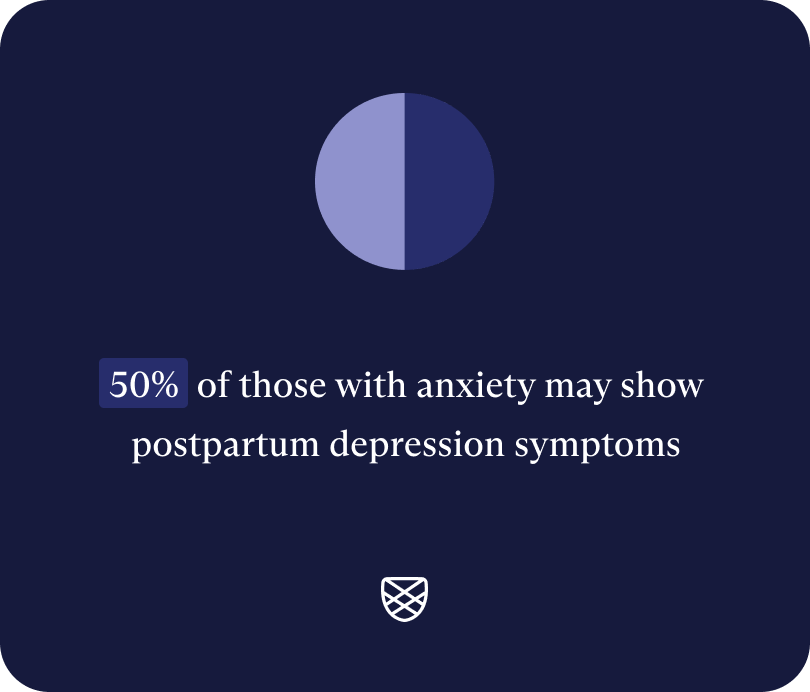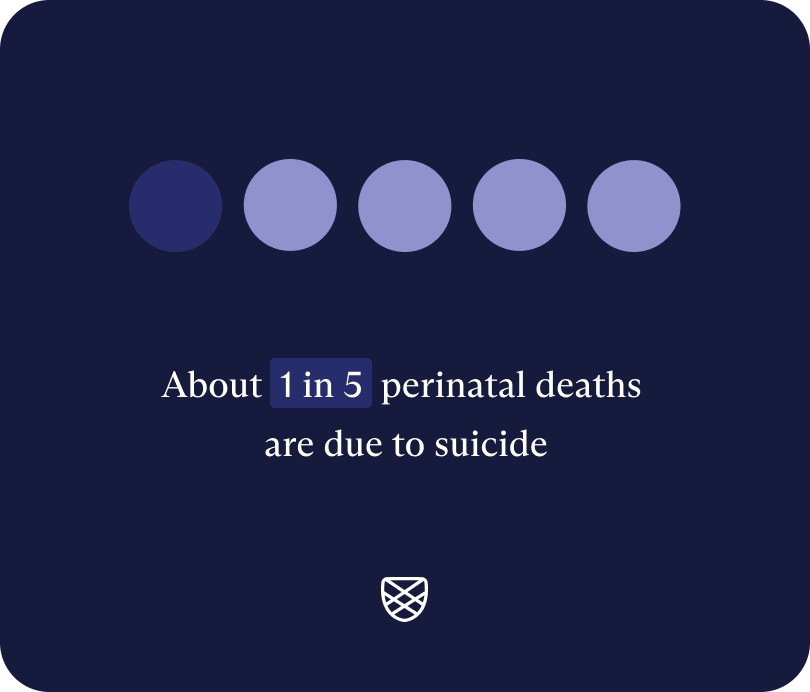
Table of Contents
7 Alarming Maternal Mental Health Statistics (and Tips for Support)
Written By: Charlie Health Editorial Team

Clinically Reviewed By: Dr. Don Gasparini
February 2, 2024
6 min.
Data that highlights the maternal mental health crisis and resources to cope with perinatal mental health conditions.
Learn more about our Clinical Review Process
Table of Contents
About one in 10 people who can become pregnant worldwide deal with mental health issues during pregnancy and the postpartum period, according to the World Health Organization. Of these, the most common conditions are depression and anxiety, both of which fall under the umbrella of perinatal mood and anxiety disorders (PMADs).
While most perinatal mental health issues are treatable, these conditions often go undiagnosed and untreated, especially among marginalized populations. For instance, data shows that up to half of perinatal women with depressive symptoms do not receive a clinical diagnosis, and as many as 85% with a diagnosis do not receive treatment (according to one study).
This gap in care takes a toll in more ways than one. A 2017 study shows that untreated PMADs cost parents and their children $32,000 dollars from conception to five years postpartum. That study also concluded that untreated PMADs resulted in a $3.4 billion increase in societal health expenditures and a $166 million increase in public assistance costs during the same time frame.
Untreated perinatal mental health conditions can affect a birthing parent’s ability to function properly, impacting children’s growth, and severe cases may lead to suicide. If you’re having thoughts of harming yourself or someone else, including an infant, this is a mental health emergency, and you should contact The Suicide & Crisis Lifeline by calling or texting 988.
The good news is that with treatment and intervention, most perinatal mental health conditions are manageable. There is robust research showing that therapy and other psychosocial interventions, like exercise and social support, are effective for treating perinatal mental health conditions (especially those that are more common, like postpartum depression).
Join the Charlie Health Library
Get mental health updates, research, insights, and resources directly to your inbox.
You can unsubscribe anytime.
Charlie Health outlined some of the most alarming mental health statistics, which highlight the maternal mental health crisis and the dearth of maternal mental health resources. Keep reading, though, because we also offered some evidence-based tips for coping with perinatal mental health issues. Whether you’re pregnant or postpartum or caring for someone who is pregnant or postpartum, it’s important to stay informed about maternal mental health and know how and when to get needed mental healthcare.
7 alarming statistics about maternal mental health
1) Most people develop the “baby blues” postpartum

Research shows that a whopping 50-80% of birthing parents develop the “baby blues” postpartum. This short-lasting condition usually appears in the first days after birth (due to a massive drop in hormones) and gets better by itself after a couple of weeks. Symptoms include depressed mood, anxiety, tearfulness, irritability, poor appetite, and sleep problems.
2) About a quarter of baby blues patients develop postpartum depression

Postpartum depression is relatively common, affecting about one in seven people in the year after they give birth. Rates of postpartum depression, though, are higher in those with postpartum baby blues, with up to one-quarter of baby blues patients going on to develop postpartum depression, data shows.
3) Half of those with anxiety may show postpartum depression symptoms

There’s a strong link between anxiety and depression postpartum. One study found that as many as 50% of people with an anxiety disorder show symptoms of postpartum depression in the two months after childbirth. Another concluded that as many as two in three women suffering from depression postpartum have an existing anxiety disorder.
4) As many as 2 in 10 people develop postpartum anxiety
Many cases of postpartum anxiety go undiagnosed, making it hard to pinpoint the prevalence of the condition. However, most studies conclude that rates of postpartum anxiety are about 11% to 21% after birth in the United States.
5) People are about 22 times more likely to have a psychiatric hospital admission following birth than pre-pregnancy
This finding is from a seminal study published in 1987 that’s since been replicated and found accurate by several groups. The research found a significantly high risk of psychiatric hospital admission, especially for psychotic illnesses, within the first 30 days after childbirth (known as “puerperal psychoses”). Women with a history of manic depressive illness and first-time mothers faced a higher risk of hospitalization, according to the study.
6) 4 in 10 people hospitalized for a mental health condition before birth were hospitalized again during postpartum
Previous hospitalizations for a bipolar or a psychotic condition are known risk factors for hospitalization again during the postpartum period, research shows. According to a 2001 study, more than 40% of women previously hospitalized for bipolar or a psychotic condition were hospitalized again during postpartum. However, perinatal psychiatric hospital admission remains relatively rare among those without previous psychiatric hospitalizations, affecting less than 1% of first births, data shows.
7) About 1 in 5 perinatal deaths are due to suicide

Death by suicide has long been a driver of maternal mortality, accounting for up to 20% of postpartum deaths, a 2005 study shows. According to more recent data from the Centers for Disease Control and Prevention (CDC), up to 23% of perinatal deaths are caused by mental health conditions, including suicide or overdoses related to substance use disorder. In fact, mental health conditions are the leading underlying cause of pregnancy-related death, according to the CDC, surpassing more commonly discussed physical conditions like sepsis and excessive bleeding.
5 tips for supporting maternal mental health
As mentioned, with proper treatment and intervention, perinatal mental health conditions are treatable, and mental health-related perinatal deaths are preventable. Above all, states, hospitals, and communities need to ensure that all pregnant and postpartum people know the warning signs of mental health crises and have resources for mental health support.
If you’re pregnant, postpartum, or caring for someone who is, though, there are also things you can do to address perinatal mental health conditions. Here are some evidence-based strategies for supporting maternal mental health:
1) Learn about maternal mental health warning signs
Research shows that the sooner you get treatment, the faster your recovery is likely to be, which makes it essential to know the first warning signs of common perinatal mental health conditions. Consider looking for a place-based parenting or perinatal class or using online resources like clinical maternal mental health sources.
2) Get enough sleep
While this can obviously be a challenge postpartum (and during pregnancy), sleep is crucial for mental health, and studies show a link between poor sleep and increased risk for perinatal mood disorders, like postpartum depression and psychosis.
3) Boost your heart rate
Studies show that exercise can help curb the effects of anxiety and depression, and exercising during pregnancy can help reduce the risk of developing postpartum anxiety and depression in the first place. Physical activity doesn’t have to be strenuous; it could mean a walk or postpartum-focused yoga class, and you should check with a doctor for pregnancy and postpartum-related exercise questions.
4) Spend time with friends and family
Social support is linked with positive mental health during the postpartum period, research shows, so make some plans to spend time with loved ones.

5) Reach out for help
Stigma and lack of access keep many people from accessing the perinatal mental healthcare they need, but remember, asking for help is a sign of bravery. Most obstetricians and gynecologists have perinatal place-based mental healthcare referrals, and there are many options online. If you’re looking for more than once-weekly perinatal mental health support from expert clinicians and others who get it, consider Charlie Heath.
References
https://jamanetwork.com/journals/jamapsychiatry/fullarticle/209983
https://jamanetwork.com/journals/jamapsychiatry/fullarticle/209983
https://www.sciencedirect.com/science/article/abs/pii/S1555415520304529
https://www.sciencedirect.com/science/article/abs/pii/S016503270700345X
https://www.sciencedirect.com/science/article/abs/pii/S0887618504000350
https://www.tandfonline.com/doi/abs/10.1080/j.1600-0412.2001.080003251.x
https://www.ncbi.nlm.nih.gov/books/NBK519070/
https://www.ncbi.nlm.nih.gov/pmc/articles/PMC4113321/
https://www.ncbi.nlm.nih.gov/pmc/articles/PMC7491613/
https://www.ncbi.nlm.nih.gov/pmc/articles/PMC7204436/#
https://www.psychiatrist.com/jcp/the-perinatal-depression-treatment-cascade/
https://www.ncbi.nlm.nih.gov/pmc/articles/PMC10050873/
https://www.ncbi.nlm.nih.gov/pmc/articles/PMC9070871/
https://pubmed.ncbi.nlm.nih.gov/35500685/
https://www.ncbi.nlm.nih.gov/pmc/articles/PMC1160560/
https://www.aha.org/maternal-mental-health/information-and-tools
https://www.cdc.gov/media/releases/2022/p0919-pregnancy-related-deaths.html





